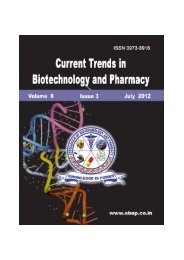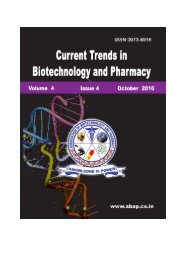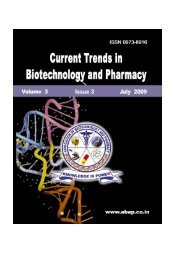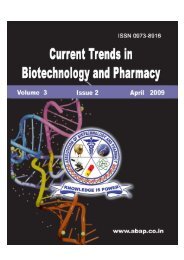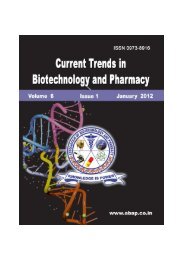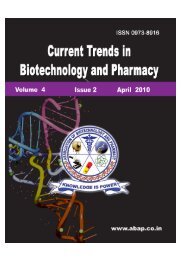d(GC) - Association of Biotechnology and Pharmacy
d(GC) - Association of Biotechnology and Pharmacy
d(GC) - Association of Biotechnology and Pharmacy
You also want an ePaper? Increase the reach of your titles
YUMPU automatically turns print PDFs into web optimized ePapers that Google loves.
Current Trends in <strong>Biotechnology</strong> <strong>and</strong> <strong>Pharmacy</strong><br />
Vol. 6 (2) 119-144 April 2012, ISSN 0973-8916 (Print), 2230-7303 (Online)<br />
balanced against other health concerns <strong>and</strong><br />
prioritized for cancers that affect the largest<br />
numbers <strong>of</strong> people, the young, or those for which<br />
there is a significant relative decrease in life<br />
expectancy compared to wealthier nations. In<br />
this review, we propose newly developing<br />
diagnostic laboratories focus initially on a group<br />
<strong>of</strong> cancers which have common biochemical<br />
dysfunctions at their origins, <strong>and</strong> the development<br />
<strong>of</strong> a small portfolio <strong>of</strong> tests, based on hereditary<br />
cancers with high-penetrance genes <strong>and</strong><br />
biomarkers which have high value to physicians<br />
making treatment choices.<br />
In both resource-rich <strong>and</strong> resource-poor<br />
settings, the clinical use <strong>of</strong> personalized medicine<br />
cannot occur without building the necessary<br />
technical, legislative, administrative <strong>and</strong> human<br />
Fig. 1. Priorities for establishing personalized oncology care in Panama<br />
134<br />
infrastructure, (Figure 2). Most developing<br />
countries will have to establish, exp<strong>and</strong> or<br />
strengthen this infrastructure, a process which<br />
will involve cooperation among many different<br />
groups. Even in medically <strong>and</strong> scientifically<br />
advanced nations, there are considerable<br />
challenges to translating basic cellular <strong>and</strong><br />
molecular research to effective patient care for<br />
personalized medicine in cancer (121) <strong>and</strong> the<br />
developing world has the opportunity to learn<br />
from what is emerging in other places, or to<br />
create new solutions that serve their local<br />
community best.<br />
Finally, the utility <strong>of</strong> certain tests <strong>and</strong><br />
therapies for cancer care is unquestioned, but<br />
concerns about the processes validating others<br />
still remain (122). As Offit (7) comments, patients<br />
1. Implement technologies <strong>and</strong> tests described in this review:<br />
· Identify funding for their implementation<br />
· Optimize tests by conducting retrospective epidemiological surveys using archived<br />
tissues <strong>of</strong> colorectal, lung <strong>and</strong> breast tumors to analyze the types <strong>and</strong> incidence <strong>of</strong><br />
specific genetic mutations, <strong>and</strong> from these <strong>and</strong> patient case files, infer the historical<br />
prevalence <strong>of</strong> familial cancer syndromes in Panama;<br />
· Offer <strong>and</strong> perform genetic analyses for patients with cancer <strong>of</strong> the lung, colorectum,<br />
breast <strong>and</strong> GIST, <strong>and</strong> their families, to aid physicians in therapeutic choices <strong>and</strong> to<br />
identify families with hereditary cancer risk;<br />
2. Develop clinical infrastructure to match <strong>and</strong> respond to new genetic technologies<br />
available:<br />
· Educational resources for oncologists <strong>and</strong> allied health pr<strong>of</strong>essionals;<br />
· Participation from peak medical bodies to support new initiatives in personalized<br />
medicine;<br />
· Funding for routine screening programs, including endoscopy <strong>and</strong> mammography, for<br />
families identified as having hereditary colorectal or breast cancer syndromes;<br />
· Funding <strong>and</strong> legalization <strong>of</strong> chemotherapies indicated by genetic analyses;<br />
3. Develop post-graduate degree programs in genetic counseling, medical genetics,<br />
molecular medicine <strong>and</strong> biotechnology;<br />
4. Publication education:<br />
· Improve participation in cancer prevention <strong>and</strong> screening programs by promoting HPV<br />
<strong>and</strong> HBV vaccines, Pap smears, mammography, prostate cancer screening, lung cancer<br />
screening, <strong>and</strong> lifestyles which include healthy diets, exercise, responsible alcohol<br />
consumption <strong>and</strong> smoking reduction;<br />
· Improve genetic literacy in schools <strong>and</strong> through public education programs.<br />
Rebecca E. Smith <strong>and</strong> Juan Miguel Pascale



